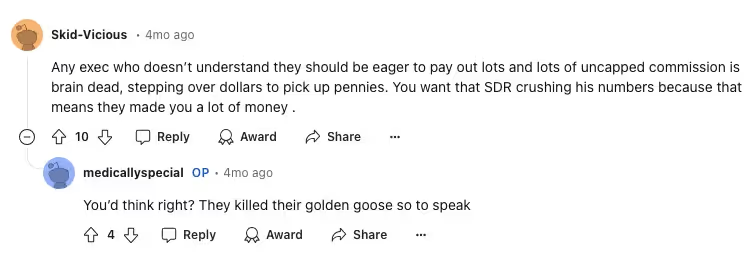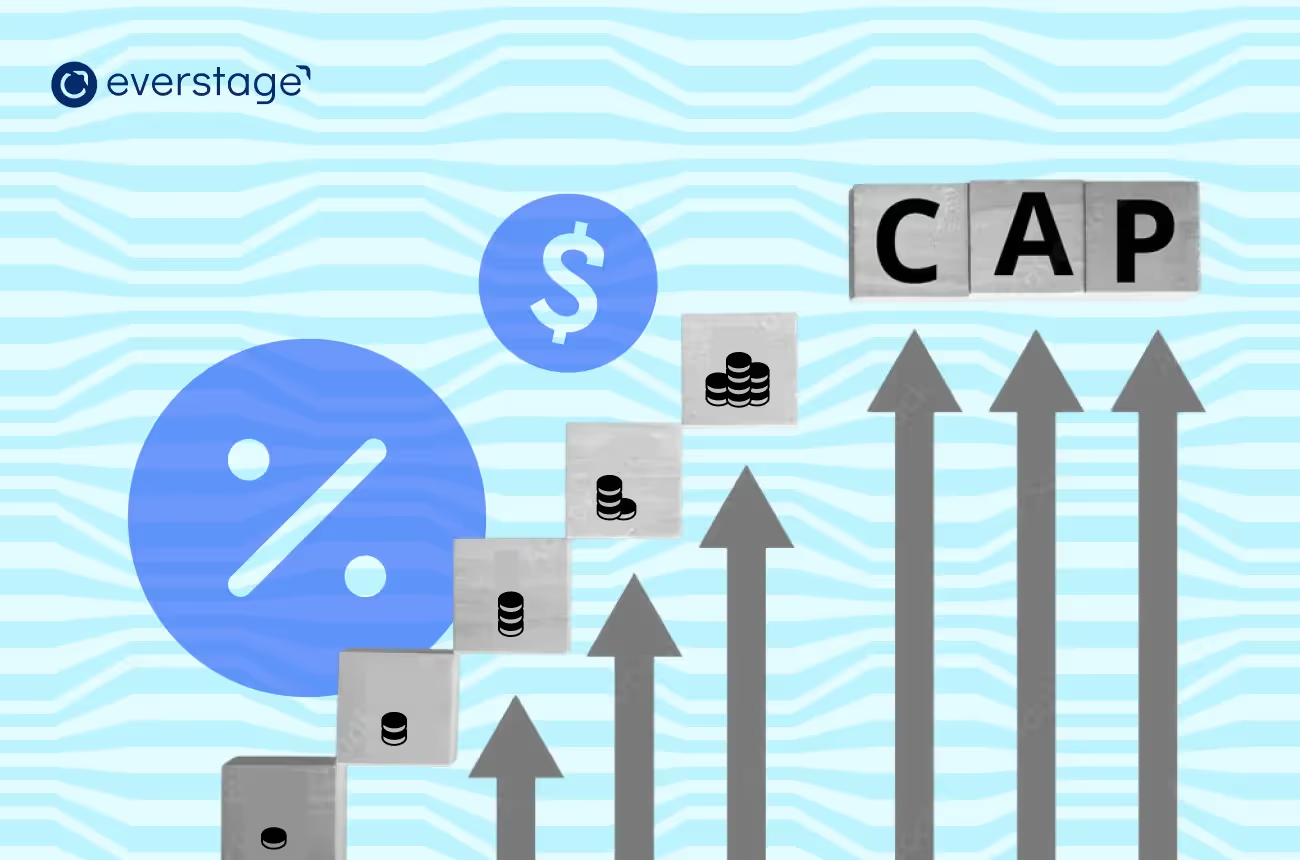Commission caps in sales compensation limit earning potential and can undermine motivation, leading to missed revenue opportunities and disengaged top performers.
- Erode morale by signaling that extra effort won’t be rewarded.
- Cause high achievers to stop pursuing big deals, impacting company growth.
- Offer short-term cost savings but risk long-term revenue loss.
- Encourage retention and performance by replacing caps with tiered or unlimited commission structures.
Capping commissions might save costs in the short term, but what does it do to the morale of your best salespeople?
A commission cap may define the upper limit of what a sales rep can earn; however, it’s the freedom to earn as much as their effort allows that keeps them truly engaged and motivated.
Take the case of John, a seasoned sales executive. He is about to close a high-value deal that would significantly exceed his target. However, he knows that his commission is capped and that the additional effort won’t translate into more income. So he decides not to pursue the deal as aggressively, believing it’s not worth the extra effort. As a result, the company misses out on a major opportunity due to John’s lack of motivation.
According to HubSpot’s Sales Trends Report, 70% of sales reps claimed that budgets were more scrutinized in 2023 compared to 2022. Commission caps can help you cut down on costs but they will eventually lead to missed business opportunities. When sales reps feel that their extra efforts won’t be rewarded, they may choose not to pursue high-value deals, which can negatively impact the company’s bottom line.
So are commission caps a necessary budget constraint or a potential killer of sales team morale? Let’s find out.
Understanding commission caps
Commission caps are a tool used in sales compensation plans to limit the amount that salespeople can earn from sales commissions. These caps can affect how much a sales rep takes home, regardless of how well they perform. While capping commissions might seem like a good way to control costs, it can also limit the earning potential of your top performers, possibly affecting their motivation and drive.
What is a commission cap?
A commission cap is a limit set on the amount of money that a sales rep can earn through sales commissions. Once this cap is reached, any additional sales do not result in extra commission payouts, even if the sales rep continues to close deals. Essentially, it’s a ceiling placed on their earnings within a given sales commission structure.
How do commission caps work in sales compensation plans?
Commission caps are typically part of a company's broader compensation plans, often tied to a specific commission rate. For instance, a sales leader might implement a cap that allows sales reps to earn commissions up to a certain amount, say $50,000. Once this amount is reached, the commission rate drops to zero, meaning no additional commission is earned on sales beyond that point.
Imagine a sales rep with a commission plan that offers 10% on all sales. If they sell $600,000 worth of products, they’d expect to earn $60,000 in commissions. However, if there’s a $50,000 commission cap, their earnings are limited to that amount, no matter how much they exceed their targets.
What is the purpose of commission caps?
The primary purpose of a capped commission is to control compensation costs, ensuring that commission payouts don't exceed what the company deems sustainable. It’s a way to budget for salesforce expenses, especially in industries where sales figures can fluctuate significantly.
Common industries and roles where commission caps are applied
Commission caps are often applied in industries with high-ticket sales or in roles where significant variability in earnings could impact the company’s financial stability. This is common in real estate, luxury goods, and certain financial services. Sales roles that deal with large contracts or high-margin products are more likely to have capped commissions to prevent a few deals from leading to disproportionate payouts.
By capping commissions, companies aim to balance rewarding their salesforce with maintaining financial control. However, this approach requires careful consideration, as it can directly impact sales performance and business success on the whole.
What is the rationale behind setting commission caps?
Commission caps are often a topic of debate in sales management. While some see them as necessary for maintaining financial stability, others believe they can demotivate top-performing salespeople.
Here’s a look at the rationale behind setting commission caps and why organizations might choose to implement them.
Cost control
- Budget predictability: Commission caps help organizations manage and forecast payroll expenses more accurately, aiding in better financial planning and avoiding unexpected costs.
- Avoiding excessive payouts: By setting a limit on commission payouts, companies can prevent large payments to top performers that might strain financial resources.
- Managing risk: Caps serve as a safeguard against unexpected financial burdens, ensuring that commission payouts remain within manageable limits even if sales performance exceeds expectations.
Financial stability
- Limiting financial exposure: Commission caps help control financial risk by ensuring that payouts do not exceed a predetermined amount, in turn—protecting the company's financial stability.
- Optimizing cash flow: Capping commissions contributes to more predictable cash flow, which is important for covering operational expenses and other financial commitments.
The hidden cost of capping commissions: Why it might hurt your sales team
Setting a cap on sales commissions can seem like a practical way to manage expenses and control risks. However, this approach can have unforeseen consequences for your sales team and overall business performance.
Here are the top four reasons you should think twice before capping sales commissions:
Impact on sales motivation
Limiting commission earnings can lead to decreased motivation among your best performers, who may feel that their hard work is no longer appreciated and rewarded appropriately.
- Demotivation of top performers
Commission caps can demotivate high achievers who are used to earning based on their performance. When top performers know their earnings are limited, they may lose their drive and seek opportunities elsewhere. This can lead to a loss of valuable talent, with high performers leaving companies due to limited earnings.
- Reduced effort
Once the commission cap is reached, some sales reps might reduce their efforts since additional sales won’t increase their earnings. This can be seen across many real-world scenarios where sales performance dipped significantly after reps hit their commission limit, affecting overall sales outcomes.
Recruitment and retention challenges
Roles with capped commissions can deter high-performing salespeople and increase turnover, as they often seek positions with unlimited earning potential.
- Attracting talent
High-performing salespeople are often drawn to roles that offer unlimited earning potential. Companies with capped commissions may struggle to attract top talent, as potential recruits might prefer positions with more lucrative compensation plans. Moreover, comparisons with companies that offer uncapped commissions show a clear advantage in talent acquisition.
- Retention issues
Companies with capped commission structures may experience higher turnover rates among their best salespeople. That said, companies without commission caps often have better retention rates, as salespeople feel their earning potential is fully recognized and rewarded.
Negative perceptions and team morale
Implementing a commission cap can lead to feelings of unfairness, harm team morale, and affect sales performance.
- Perceived unfairness
Commission caps can create a sense of unfairness among the sales team, leading to decreased morale. If sales reps aren't rewarded for their performance, they may feel undervalued, which can disrupt team cohesion and morale.
- Erosion of trust
When salespeople see their earning potential limited by a commission cap, it can erode their trust in management. Strategies that appear to restrict earnings might backfire, leading to decreased trust and engagement among the sales force.
Financial implications for the business
Short-term savings from commission caps can result in long-term revenue losses by limiting sales growth and performance.
- Short-term savings vs. long-term losses
While commission caps might offer short-term savings on compensation payouts, they can lead to long-term revenue losses. Businesses that save on commission costs in the short run often find that reduced sales performance impacts revenue.
- Stifling growth
Caps on commissions can limit sales growth and scalability. Companies that eliminate commission caps typically experience revenue boosts and enhanced sales performance, emphasizing the benefits of unrestricted earnings.
A financial services company eliminated commission caps and saw a 38% increase in revenue as a result. The move allowed financial advisors to focus on high-net-worth clients without worrying about hitting a ceiling, leading to a 45% increase in premium investment accounts. This increase in revenue supported the company's growth strategy and enabled it to scale operations and launch new financial products faster.
Key alternatives to capped commissions
Exploring alternatives to capped commissions is crucial for maintaining a motivated and high-performing sales team. Additionally, considering other compensation models can better align incentives with performance and drive continuous growth.
Let’s now run through a few alternatives to capped commissions:
Tiered commission structures
Tiered commission structures offer a way to motivate sales representatives to exceed their goals. This model provides increasing commission rates as sales volume or revenue targets are achieved. Rewarding higher performance with higher rates encourages continuous effort and ambition.
- Tiered commissions are a motivator for continuous performance
Tiered commission structures align compensation with sales goals, motivating sales professionals to push beyond basic targets. As they achieve higher levels of sales, they earn a greater percentage of their commission, fostering sustained motivation and effort.
- An example of successful tiered commission models
Many companies effectively use tiered commission models. For example, a real estate brokerage might offer a base commission rate for initial sales and increase the rate for sales beyond specific thresholds. This approach boosts sales in general and keeps top performers engaged and motivated. A B2B SaaS company could use tiered rates to reward subscription renewals, increasing commissions progressively as sales milestones are met.
Performance bonuses
Performance bonuses are another alternative to capped commissions, providing more incentives for exceptional sales achievements. These bonuses are awarded for meeting or exceeding predefined sales goals or for exceptional contributions to the company's success.
- Use of additional bonuses to reward exceptional performance
Performance bonuses can serve as powerful motivators by offering extra financial rewards for surpassing sales targets. Unlike commission caps, which limit potential earnings, bonuses provide additional incentives for outstanding performance—driving sales representatives to achieve and exceed their goals.
- A case study showing improved performance with bonuses instead of caps
A SaaS company saw a 35% increase in revenue after replacing their commission caps with a performance-based bonus structure. By offering higher bonuses for exceeding sales milestones—5% for 110% of the quota, 10% for 125%, and 15% for 150%—they motivated their sales reps to push beyond their targets. The change led to a 50% increase in the number of reps surpassing 125% of their quota, resulting in a more driven sales force.
Profit sharing
Profit sharing aligns sales incentives with the overall profitability of the company. By linking a portion of the compensation to the company's financial success, profit sharing fosters a sense of ownership and collective responsibility among the sales team.
- Aligning sales incentives with company profitability
Profit-sharing plans distribute a share of company profits among employees, including sales representatives. This model encourages sales professionals to contribute to the company’s financial health, as their earnings are directly tied to the company's success.
- A real-world example of a profit-sharing plan boosting sales efforts
For over 20 years, Home Depot has rewarded eligible non-management staff through its "Success Sharing" profit-sharing plan. Each year, the company allocates a portion of its annual profits as cash bonuses. Full-time employees who have been with the company for more than a year receive these bonuses twice a year, based on their hours worked. In 2022, Home Depot distributed approximately $409 million to its non-management associates across all stores.
Profit-sharing plans, like those at Home Depot, can significantly enhance sales efforts by creating a direct link between company performance and employee compensation. By distributing a portion of profits to employees, companies incentivize their staff to contribute more actively to the company’s success. This alignment of goals fosters a sense of ownership among employees, motivating them to work harder and achieve better sales results.
Real-world insights and expert perspectives on sales commission caps
Implementing sales caps can have varied effects, depending on the industry and company culture.

In many cases, companies have found that removing commission caps boosts sales performance and enhances motivation among sales professionals. For instance, tech startups and real estate firms often report positive outcomes when adopting uncapped commission structures, as these plans align more closely with company goals and reward top performers more effectively.
An article by HubSpot titled ‘The Nature and Necessity of Uncapped Commission’ emphasizes the critical role of financial incentives in motivating sales representatives.
It points out that
"many salespeople won’t be receptive to a pat on the back, and a trophy that doesn’t come with some sort of tangible incentive might not be enough to set your highest-performing reps on the right track. A financial reward is often the most powerful motivator for reps—and leaving commission uncapped can provide just that."
For top performers—financial rewards are often more motivating than non-monetary recognition. An uncapped commission structure can therefore significantly boost sales performance by aligning compensation directly with individual success.
According to HubSpot's 2024 State of Sales Report, a fair compensation structure and motivating incentive plans are essential for creating a successful internal sales culture. The report notes that uncapped commissions can partially fulfill this need by offering continuous earning potential, which contributes to a positive and productive work environment.
As the report suggests, "happy employees lead to a healthy company," implying that an uncapped commission can lead to greater satisfaction and effectiveness among sales professionals.
In another article, ‘Why Sales Compensation Plans Fail and How to Fix Them,’ Marie Verdier discusses the merits and drawbacks of capping sales compensation. Verdier shared that a cap on the amount of commissions might prevent salespeople from achieving their full potential. Without this limitation, sales representatives are more likely to exceed their targets, as they are incentivized to continue performing at high levels.
Verdier's analysis reflects the dual nature of compensation caps: they manage costs but can also demotivate top performers by limiting their earnings. The key takeaway is that while capped commissions might initially seem prudent from a financial perspective, removing these caps can lead to significant increases in sales performance and profitability.
Scientific research supports Verdier’s observations, demonstrating that removing maximum limits on the amount of commissions can lead to substantial revenue increases. She explained that—
"Even scientific studies prove that revenue considerably increases when we remove maximum limits. What's important here is the economics: Higher compensation must directly translate into higher profitability for the company."
This evidence highlights the economic benefit of removing commission caps, suggesting that the increased motivation and performance of sales representatives can outweigh the additional costs associated with higher commission payouts.
Bottom line
As we’ve seen so far, removing commission caps can discourage sales teams, leading to lower motivation and decreased performance. Restricting earnings might cause talented salespeople to seek opportunities elsewhere, ultimately harming your business’s growth and sales results.
The key is to prioritize creating sales compensation plans that balance motivation and company goals. Setting a commission cap, even a seemingly unreachable one, can have an adverse psychological effect on your sales force. Businesses need to think hard before they cap and weigh in on the pros and cons of capping commissions. Moreover, regular evaluation is essential to ensure that commission caps are aligned with evolving business strategies and do not unintentionally limit sales potential or drive.
Read our comprehensive guide on how to design compensation plans that drive your sales team to excel and create a culture of winning results. Get your free copy today!




.avif)

.avif)

.avif)

.avif)

